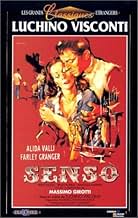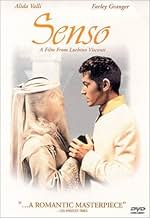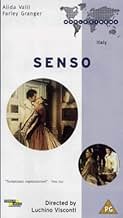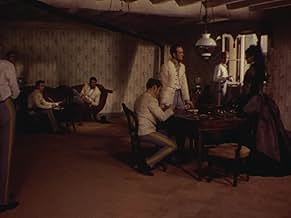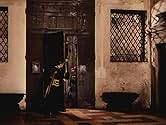An Italian Countess is allied with Nationalists during the Italian-Austrian war of unification. However, she risks betraying their cause when she falls in love with an Austrian lieutenant.An Italian Countess is allied with Nationalists during the Italian-Austrian war of unification. However, she risks betraying their cause when she falls in love with an Austrian lieutenant.An Italian Countess is allied with Nationalists during the Italian-Austrian war of unification. However, she risks betraying their cause when she falls in love with an Austrian lieutenant.
- Awards
- 3 wins & 2 nominations
Franco Arcalli
- Un soldato
- (uncredited)
Aldo Bajocchi
- Un soldato
- (uncredited)
Ottone Candiani
- Un soldato
- (uncredited)
Nando Cicero
- Un soldato
- (uncredited)
Claudio Coppetti
- Un soldato
- (uncredited)
Cristoforo De Hartungen
- Il generale Hauptmann
- (uncredited)
Tony Di Mitri
- Un soldato
- (uncredited)
Storyline
Did you know
- TriviaThe film opens in La Fenice, the Venice opera house. La Fenice was destroyed by arson in 1996, but reopened in 2003. Enlarged frames of this movie were used as a reference in reconstructing it.
- Quotes
Il tenente Franz Mahler: It's too late! It's over! I'm not your romantic hero!
- Alternate versionsTwo versions of the film are available on video.
- One version is missing the scene where Livia tries to explain where all the money meant for the troops went.
- Another version is missing the climatic battle sequence between the Austrian and Italian troops.
- ConnectionsEdited into Histoire(s) du cinéma: La monnaie de l'absolu (1999)
- SoundtracksSinfonia N. 7 in mi maggiore (7th Symphony)
Music by Anton Bruckner
Performed by Orchestra Sinfonica Nazionale della Rai
Conducted by Franco Ferrara
Featured review
Opens with a lush rendition of Il Trovatore at Teatro La Fenice, SENSO is an ostentatious melodrama imprinted with Visconti's pronounced blue blood opulence, retells an Italian countess' (Valli) vain and poignant attempt to pursue her one-sided affection to an Austrian officer (Granger shines in the rich Technicolor palette as an Adonis), whose misogyny and promiscuity will cause his own doom and mar her mentality up to the hilt.
The film sets its time during the fall of Austrian occupation in Venezia 1866, Valli is wavering between her bureaucratic husband (Moog) and rioting cousin (Girotti), to break loose from the stalemate, she irrevocably falls for a young lieutenant in the opponent camp, but he is no knight in shining armor but a foul and spineless scoundrel with irresistible sheen of deadly charm. Granger's gorgeous lover-boy image is a quintessential smokescreen to veil his despicable innards, but after all, it is a consensual deal despite of Valli's false hope, more significantly its anti-war signals have been forcibly cast by Granger's self-abandonment and the lousy war battlefield experienced by Girotti, which, more plausibly it is an intentional move by Visconti, a distraction from the central turmoil, but done with a tinge of amateurish fecklessness.
Valle shoulders on a profound effort to scrutinize a woman's inscrutable sexual desire which being repressed for too long, both she and Granger align themselves with Visconti's brimful-of- emotion style (again, thanks to Techincolor and the overstuffed score as well) which approximate the OTT threshold in certain degree, although falling out with Visconti eventually, Granger succeeds in bringing about his best screen persona and it was such a great era when a gay man can play an outright straight womanizer on the celluloid.
On the one hand SENSO fails to impress me as my favorite among Visconti's work of art, and scale-wise pales by comparison with LUDWIG (1972, 8/10) and THE LEOPARD (1963, 8/10), but on the other hand, only Visconti can flaunt such an overbearing melodrama with true mettle and without any compromise, a trend-setter would inspire later kindred spirits, for instance Baz Luhrmann's 3D adaption of the bourgeois sumptuosity THE GREAT GATSBY (2013, 8/10).
The film sets its time during the fall of Austrian occupation in Venezia 1866, Valli is wavering between her bureaucratic husband (Moog) and rioting cousin (Girotti), to break loose from the stalemate, she irrevocably falls for a young lieutenant in the opponent camp, but he is no knight in shining armor but a foul and spineless scoundrel with irresistible sheen of deadly charm. Granger's gorgeous lover-boy image is a quintessential smokescreen to veil his despicable innards, but after all, it is a consensual deal despite of Valli's false hope, more significantly its anti-war signals have been forcibly cast by Granger's self-abandonment and the lousy war battlefield experienced by Girotti, which, more plausibly it is an intentional move by Visconti, a distraction from the central turmoil, but done with a tinge of amateurish fecklessness.
Valle shoulders on a profound effort to scrutinize a woman's inscrutable sexual desire which being repressed for too long, both she and Granger align themselves with Visconti's brimful-of- emotion style (again, thanks to Techincolor and the overstuffed score as well) which approximate the OTT threshold in certain degree, although falling out with Visconti eventually, Granger succeeds in bringing about his best screen persona and it was such a great era when a gay man can play an outright straight womanizer on the celluloid.
On the one hand SENSO fails to impress me as my favorite among Visconti's work of art, and scale-wise pales by comparison with LUDWIG (1972, 8/10) and THE LEOPARD (1963, 8/10), but on the other hand, only Visconti can flaunt such an overbearing melodrama with true mettle and without any compromise, a trend-setter would inspire later kindred spirits, for instance Baz Luhrmann's 3D adaption of the bourgeois sumptuosity THE GREAT GATSBY (2013, 8/10).
- lasttimeisaw
- Oct 2, 2013
- Permalink
- How long is Senso?Powered by Alexa
Details
- Release date
- Country of origin
- Languages
- Also known as
- The Wanton Contessa
- Filming locations
- Teatro La Fenice, Venice, Veneto, Italy(opening scenes)
- Production company
- See more company credits at IMDbPro
Box office
- Budget
- ITL 700,000,000 (estimated)
- Gross US & Canada
- $27,723
- Opening weekend US & Canada
- $3,984
- Oct 28, 2018
- Gross worldwide
- $27,723
- Runtime2 hours 3 minutes
Contribute to this page
Suggest an edit or add missing content


![Watch Trailer originale italiano [OV]](https://m.media-amazon.com/images/M/MV5BYzc0Y2MyOGMtMzg0My00Mzc4LWIwYjItZjg1ZDhmMDZmOTlkXkEyXkFqcGdeQXRodW1ibmFpbC1pbml0aWFsaXplcg@@._V1_QL75_UX500_CR0)




